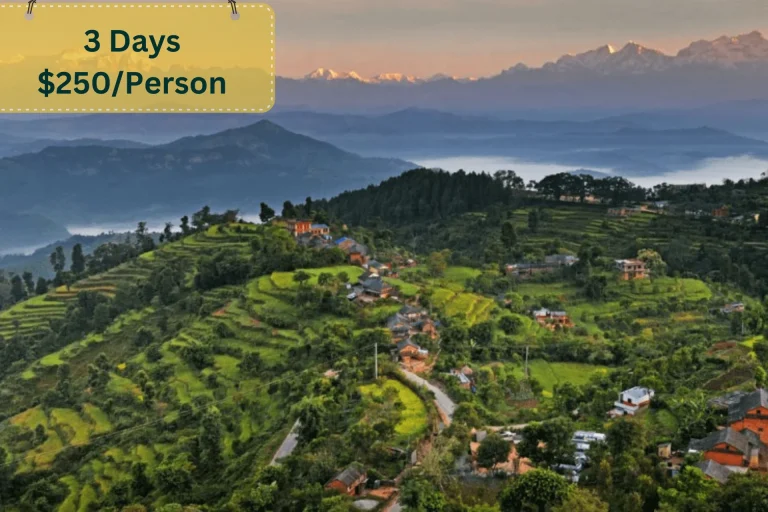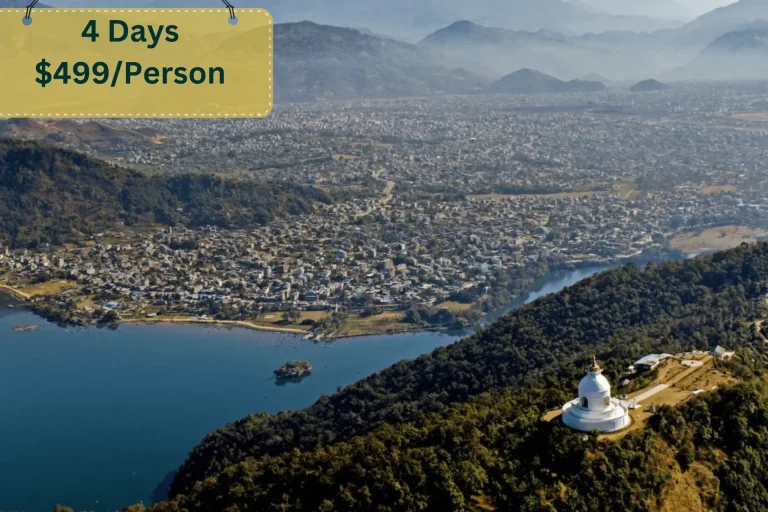Lamjung Durbar
Trip Overview
Lamjung Durbar, located in the Lamjung district of Nepal is a historically significant site that holds deep cultural and ancestral importance. Nestled on a hilltop, this ancient palace served as the royal seat of the Lamjung Kingdom before the unification of Nepal. The Durbar is particularly noteworthy as the ancestral home of the Shah dynasty which played a crucial role in shaping the history of modern Nepal. King Kulmandan Shah, an ancestor of King Prithvi Narayan Shah, the unifier of Nepal, once ruled from this very palace, making it a cornerstone in the narrative of the nation’s formation.
The architectural style of Lamjung Durbar reflects traditional Nepali design, with stone and mud-brick construction, wooden windows and slate roofs. Though time has taken its toll on the structure, the palace still exudes a sense of historical grandeur and cultural richness. Within the complex, the Bhimsen Temple stands out as a key religious site, dedicated to the deity Bhimsen, who is highly revered in Hinduism. The temple along with other historic structures in the Durbar serves as a focal point for local religious practices and festivals, preserving the spiritual heritage of the region.
Set against the backdrop of the Annapurna and Manaslu mountain ranges, Lamjung Durbar offers breathtaking panoramic views of the surrounding valleys and hills. The natural beauty of the area with its terraced fields, dense forests and traditional villages enhances the allure of the palace, making it not only a site of historical interest but also a destination for nature enthusiasts. The Durbar’s location also makes it a gateway to several trekking routes in the Annapurna region, attracting trekkers and adventurers who seek to explore the pristine landscapes of central Nepal. Efforts are being made to restore and preserve Lamjung Durbar as a cultural heritage site. Lamjung Durbar remains a significant symbol of the country’s royal history and cultural identity. For visitors, it offers a unique opportunity to connect with Nepal’s past, set in a serene and picturesque environment.
- Historical Significance
- Kalika Temple
- Bhimsen Temple
- Birthplace of Shah Dynasty
- Architectural Features
- Cultural and Religious Significance
- Scenic Location
- Trekking and Hiking
- Peaceful Environment
Cost Includes:
- Accommodation
- Meals
- Transportation
- Guide and Support Staff
- Sightseeing
Cost Excludes:
- International Airfare
- Visa Fees
- Personal Expenses
- Travel Insurance
- Optional Activities
- Tips and Gratuities
- Equipment and Gear
- Cost Due To Unforeseen Events
Note: The cost for each trip may vary based on the selected itinerary, the duration of the trip, and any personal preferences you may have.
Follow Site Rules
Adhere to any rules or guidelines provided by site authorities. This may include restrictions on photography or access to certain areas.
Preserve the Site
Avoid touching or leaning on ancient structures and artifacts. Follow all posted signs and instructions to help preserve the historical integrity of the durbar.
Maintain Cleanliness
Dispose of any litter properly and avoid leaving trash behind. Help keep the site clean and respectful for future visitors.
Stick to Designated Paths
Stay on marked paths and walkways to avoid damaging the site and ensure your safety. Be cautious when walking on uneven terrain.
Photography Etiquette
Ask for permission before taking photos, particularly inside temples or of people. Respect any restrictions on photography that may be in place.
Be Mindful of Local Culture
Lamjung Durbar is a site of cultural and historical significance. Be respectful of local customs, ceremonies and traditions observed in and around the site.
Respect Sacred Spaces
Be especially respectful when entering religious areas within the durbar. Follow any specific customs or practices observed in these spaces.
Support Local Businesses
If there are local vendors or small businesses near the site, consider supporting them by purchasing local goods or refreshments.
How do I get to Lamjung Durbar?
Lamjung Durbar is located in the Lamjung District of Nepal. You can reach Lamjung by road from Kathmandu. The journey involves traveling to Besisahar and then taking a local vehicle or trekking to the durbar. The trip may take around 6-8 hours from Kathmandu.
What should I wear when visiting Lamjung Durbar?
Wear modest clothing that covers your shoulders and knees, as a mark of respect when visiting religious and historical sites. Comfortable walking shoes are also recommended due to the uneven terrain.
Can I take photographs at Lamjung Durbar?
Photography is generally allowed, but be mindful of any specific rules regarding photography. Always ask for permission before taking photos, especially inside temples or of people participating in ceremonies.
What facilities are available at Lamjung Durbar?
Facilities at Lamjung Durbar may be limited. There are usually small shops and local eateries in the vicinity. It’s advisable to carry water and snacks with you, as amenities may be sparse.
Are there any health and safety precautions I should take?
Wear comfortable walking shoes suitable for uneven terrain. Bring sun protection such as a hat and sunscreen and stay hydrated. If traveling during the monsoon season, be cautious of slippery paths.
What local customs should I be aware of?
Respect local customs and traditions, particularly when visiting religious sites within the durbar. Follow any instructions provided by site authorities and observe proper etiquette.
Are there any nearby attractions worth visiting?
Yes, nearby attractions include scenic viewpoints offering panoramic views of the Himalayas and local villages. You might also explore other historical sites and natural landscapes in the Lamjung District.
Trip Start & End | Kathmandu – Kathmandu | Meals | Breakfast, Lunch and Dinner |
Maximum Altitude | 1214m, Lamjung Durbar | Difficulty Level | Light |
Transportation | Car, Jeep or Bus | Best season | Oct-Apr |
Accommodation | Hotel, Guest House | Trip Area | Lamjung District |
Day 1: Drive from Kathmandu to Besisahar
→ Arrival in Besisahar: Begin your journey to Lamjung by arriving in Besisahar, the district headquarters of Lamjung. The drive from Kathmandu takes around 6-7 hours.
→ Check-In at Hotel: Settle into a hotel or guesthouse in Besisahar. Visit and explore Besisahar.
→ Overnight: Stay in a hotel.
Day 2: Exploration of Lamjung Durbar and Surrounding
→ Visit Lamjung Durbar: After lunch, head to Lamjung Durbar, located a short drive or hike from Besisahar. The Durbar is set on a hilltop and the hike up provides beautiful views of the surrounding area.
→ Visit Bhimsen Temple: Within the Durbar complex, visit the Bhimsen Temple, dedicated to the Hindu deity Bhimsen. This temple is a focal point of local religious life and offers insights into the spiritual practices of the region.
→ Sunset Views: Enjoy the sunset from the hilltop, with stunning views of the valleys and distant Himalayan peaks.
→ Return to Besisahar: Return to your accommodation in Besisahar for dinner and relaxation.
Day 3: Departure
→ Explore Marsyangdi River Valley: Spend sometimes exploring the Marsyangdi River Valley. Begin your return journey to Kathmandu. Arrive back in Kathmandu, concluding trip to Lamjung Durbar.


